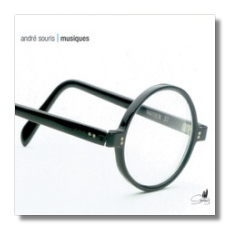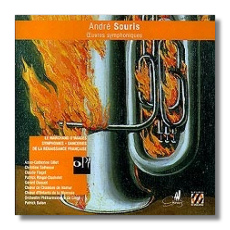
The Internet's Premier Classical Music Source
Related Links
- Latest Reviews
- More Reviews
-
By Composer
-
Collections
DVD & Blu-ray
Books
Concert Reviews
Articles/Interviews
Software
Audio
Search Amazon
Recommended Links
Site News
 CD Review
CD Review
André Souris

Chamber Music
- Tombeau de Socrate
- Choral, Marche et Galop
- Rengaines
- L'autre voix
Anne-Catherine Gillet, soprano
Christine Solhosse, mezzo-soprano
Antoine Acouisto, solo trumpet
Emile Cantor, viola
Jean-Michel Charlier, clarinet
Marc Danel, violin
Quatuor Danel
Marcel Dossogne, narrator
Baudouin Giaux, flute
Jean-Pierre Haeck, trombone
Padla Larini, harp
Arnaud Moyencourt, barrel-organ mignon
Bob Permentler, bassoon
André Pichal, French horn
Karel Schoofs, oboe
Jose Schyns, trombone
Phillipe Terseller, piano
Niranjan Wijewickrema, trumpet
Cyprès CYP4610 rec. May 2000-Oct 2001 Brussels & Uccle, Belgium 70 mins


Music for Orchestra, Choirs and Soloists
- French Renaissance Dances (1932)
- Symphonies (1939)
- Cantate Rurale (1965)
Anne-Catherine Gillet, soprano
Christine Solhosse, mezzo-soprano
Claude Flagel, tenor
Patrick Ringal-Daxhelet, bass
Chamber Choir of Namur
Children's Choir of La Monnaie
Philharmonic Orchestra of Liège/Patrick Baton
Cyprès CYP7607 rec. July 1999 Namur, Belgium 68 mins
André Souris (1899-1970) was a one-off, friend of Stravinsky and promoter of the young Boulez, a Belgian original known as the 'musician of the surrealists', latterly a specialist in lute tablatures, with lifelong open-mindedness and contempt for specialisation. In most of his music he makes use of popular, traditional and well-known art-music, retaining their expressive power although inserted into his own new language.
Following two sorties from London under the English Channel to Antwerp 2001 (Joint Venture) and Orpheus Prize 2002 we have come to appreciate the extent to which Belgium (and especially Flanders), although so close to England geographically, remains musically amongst the least known and understood of our neighbours.
I have received recordings of some music by several of their composers of special interest and uniqueness. These two CDs have given us enormous pleasure for their freshness and easy listening; they make you think whilst you smile.
New Grove covers André Souris' career from 'deliberate banality' modelled on Satie & Stravinsky through flirtation with serialism (L'autre voix). Souris pays homage to Satie with Tombeau de Socrate for unaccompanied trumpet, and his Inventions for Organ, played on a barrel organ, is a weird and wonderful collage of perforated pages from operettas, reassembled upside down and back to front, whatever, splendid anarchic surrealism, close to Max Ernst and Magritte. His Symphonies belong to the same world as Stravinsky's Symphonies of Wind Instruments and the Choral, Marche et Galop for brass quartet to that of The Soldier's Tale. The vocal items include several sets of songs and Le Marchand d'Images, a 'rural cantata' founded on Walloon folksong, all given with apparently artless directness, actually a sophisticated artlessness that disguises art. There are many endearing compositions reflecting his classical interests through his personal voice, with expert instrumentation and orchestration. Those for brass ensemble and for wind quintet may be just the novelties which enterprising ensembles need to enliven their recital repertoires. There is also enough purely instrumental music that you should not be put off by the absence of translations of the vocal items.
The chosen selections and performances are exemplary as is the whole production; these recordings were clearly labours of love by all concerned. The lively presentations reflect Souris's ever-freshness, with lengthy, fascinating insert notes (in English and other languages) which are both serious and tongue-in-cheek.
His chamber music is played, we are told, by musicians who "all studied their instruments from the age of two, gave first recitals at five and have played in the major concert halls and famous festivals accompanied by the finest orchestras… ", and its cover picture is of spectacles with a single large central lens for a contemporary Polyphemus! That is the CD I recommend exploring first, for its greater variety and special flair.
Copyright © 2002, Peter Grahame Woolf

















